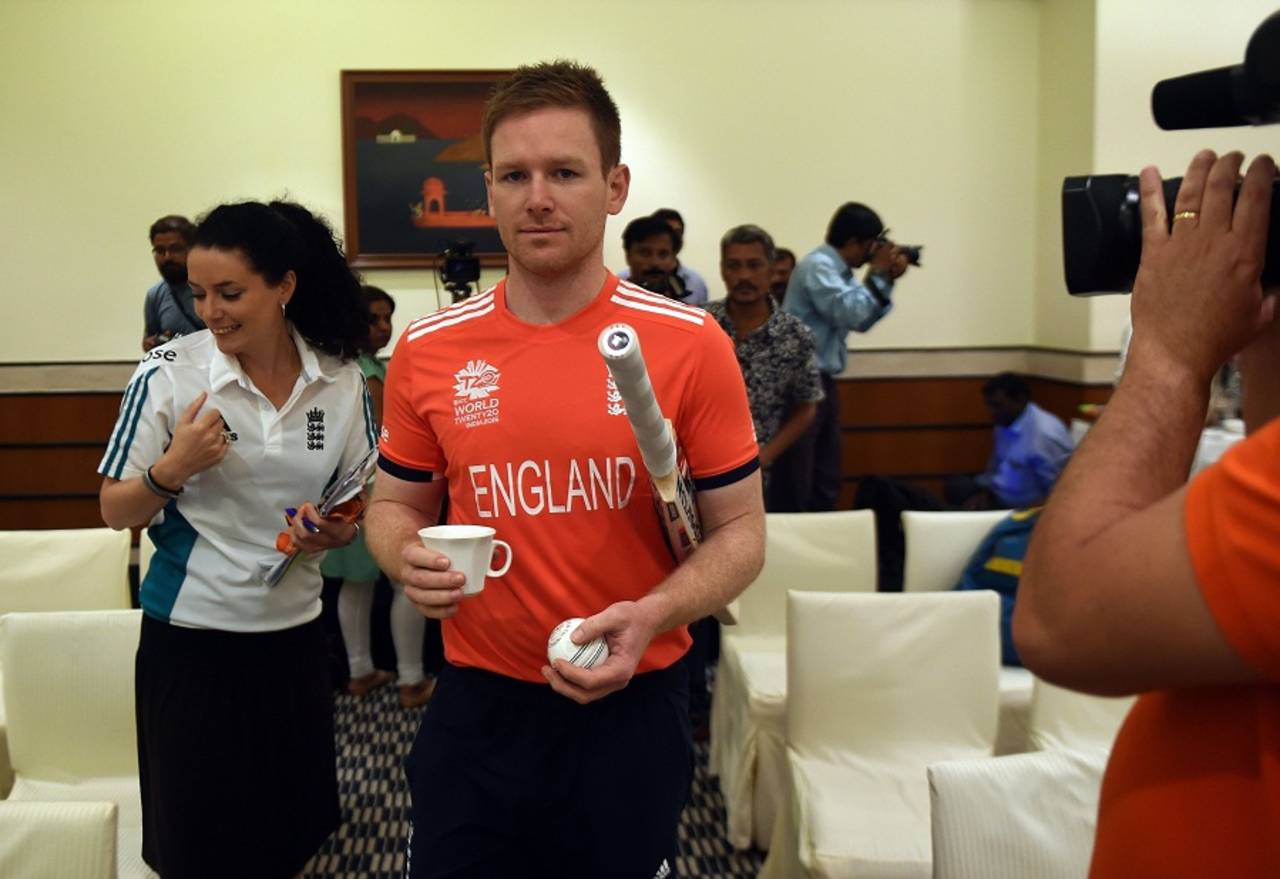Could Morgan be England's McCullum?
The team's transformation has been dramatic and their captain has been instrumental in bringing it about
Jon Hotten
15-Mar-2016

Eoin Morgan was among the first England players to adapt to the new realities of limited-overs cricket • AFP
Eoin Morgan is emerging as one of England's most significant captains, a catalyst in an era of change. In two decades or so, when the light refracts on these early years of T20 and franchise cricket, we will see his kind as pioneers, men in the forefront of a revolution in technique and mindset; pathfinders and phase-shifters. With wrists as steely as those ice-chip eyes, he is both skipper and father figure to England's emergent side, a man who has walked it like he talks it, whatever the game has thrown at him.
Morgan still has something of the outsider about him, and not just in the lilt of his accent. His talent is freakish, his batting outré and outrageous, yet subject to some great valleys of form from which it often looks like he'll never emerge. It may have cost him the chance of a substantial Test career (this is England's loss: I feel he'd be an excellent captain there, too) but the way of white-ball cricket means he is only ever a few of his mighty straight hits and whip-crack reverses away from his best. Along with Kevin Pietersen - another outsider - he was the first of England's players to truly seize this new reality. It's no coincidence that they have been the most consistently in demand from franchise teams.
Cricket at this level can be a game of bluff. Adam Gilchrist tells a lovely story about batting against Murali with Mike Hussey, when the great Sri Lankan was in his pomp. Neither batsman could pick which way the ball was going, and were playing him purely on line. In between being beaten by the vast array of offbreaks and doosras, Hussey was slog-sweeping Murali into the stands. Tea came and everyone trooped off. Back in the dressing room Gilchrist asked Hussey how he was feeling.
"I'm gone, mate," he said, looking exhausted. "I've got no idea what he's doing."
Gilchrist went for a stroll up the corridor, where he heard Murali talking to a member of Australia's backroom team who had previously worked with Sri Lanka:
"I don't know where to bowl to Hussey," Murali was saying. "He keeps hitting me for six."
In India, England have the classic puncher's chance - consistency will be their problem, as it often is with younger sides. But if they are not exactly feared, they will at least be respected
Morgan has that kind of inscrutability, and also a gambler's urge, which has been freed under Trevor Bayliss and Andrew Strauss. England's transformation has been dramatic and Morgan has been forceful in implementing it. There was an instructive little exchange in February, before the World T20 squad was announced and Pietersen was crowning a splendid run with the bat in the Ram Slam and the Big Bash. There was, of course, no chance that he would be selected, but a door is never shut until it's shut, and it was Morgan who closed this one, telling the Daily Mail: "Kevin will not be picked. That's from me." There was a message contained within his terseness, and it wasn't just for Pietersen, who had for a long time regarded Morgan as an ally. Morgan was making it clear that he was aligned with England's direction, sure of their policy, not working to any other agenda. He was entirely behind his men.
It was evidence too, that while England don't quite have a free pass at this competition, it is a staging post along the way. The Champions Trophy of next year and the World Cup of 2019, both in England, and the World T20 in Australia a year later, are the real targets, and the peak of Morgan's international career.
In India, England have the classic puncher's chance - consistency will be their problem, as it often is with younger sides. But if they are not exactly feared, they will at least be respected. Morgan learned a lot from Brendon McCullum's captaincy at the World Cup in Australia. The momentum that New Zealand rode was rooted in their skipper's fearlessness, and England can expect the same from Morgan. He is cut from that cloth. He will go for it.
His manipulation of resources in the field will be tested, as will his ability to bluff. How he bowls Adil Rashid and who he uses at the death are the obvious tests. Yet the initial group matches have seen heavy scoring in the first six, followed by a slower climb to totals between 160 and 180. If Morgan can conjure something early on - an unexpected bowler, an innovative tactic - it may be enough to shade a match or two.
In batting, he preaches adaptability. The first half of last year saw England go full throttle in every game, with Morgan happier for them to be bowled out with unused overs rather than going into their shell. It was designed to show England that they could achieve totals not met before. The lesson is learned, and the next stage is in understanding how to tailor a defendable score.
Pietersen put a little pressure on Morgan in a Twitter q&a for the Daily Telegraph this week, naming him as England's key batsman. Morgan will not shy away from that. Like Pietersen, his is a talent that covets the big stage. What better way to assert his already formidable grip on England's white-ball game? As with McCullum, he must sense his time is soon approaching.
Jon Hotten blogs here. @theoldbatsman